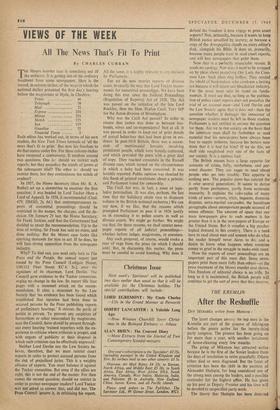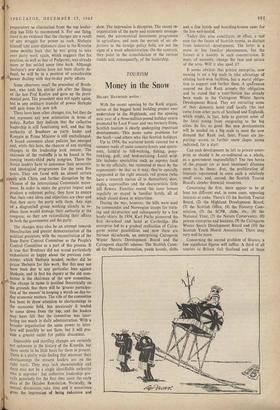THE KREMLIN
After. the Reshuffle
DEV MURARKA writes from Moscow : . The latest changes among the top men in the Kremlin are part of the process of tidying-up before the guests arrive for the twenty-third party congress. The process has been going on for more than a year, with another instalment of house-cleaning every few months.
The going of Mikoyan has attracted notice because he is the first of the Soviet leaders from the days of revolution to retire gracefully. Others either died or were disgraced. But the focus of attention has been the shift in the position of Alexander Shelepin, for long considered one of the strong men among the leaders, and a possible contender for the highest office. He has given up his post as Deputy Premier and his time will be devoted to unspecified party work.
The theory that Shelepin has been demoted preparatory to elimination from the top leader- ship has little to recommend it. For one thing, there is no evidence that the changes are a result of any struggle for power as such. Shelepin himself told some diplomats close to the Kremlin some months back that he was going to take over party work again, which suggests that his position, as well as that of Podgorny, was already more or less settled some time back. Although Shelepin's new duties have not been clearly de- fined, he will be in a position of considerable
4c'rpower dealing with day-to-day party affairs.
Some observers recall the precedent of Brezh- nev, who took his similar job after the illness of the late Frol Kozlov and gave up the presi- dential post. The precedent may not apply again, but in any ordinary transfer of power Shelepin will gain from his new job.
There have been other changes, too, but they do not represent any new orientation in terms of Policy. Rather they indicate that the collective leadership is still functioning well, and that the authority of Brezhnev as party leader and Kosygin as Prime Minister is still unchallenged. A broad consensus about policies has emerged and, while this lasts, the chances of any startling changes in the leadership look remote. The rationale of the reshuffle is to be found in the coming twenty-third party congress. There the Soviet leaders have to announce their economic and ideological programmes for the next five Years. They are faced with an almost certain fi4split with China and further disruption by the Chinese of the international Communist move- ment. In order to make the greatest impact and produce a coherent policy, they have to ensure that their own ideas and objectives are clear and that they carry the party with them. Any sign of a disgruntled group working silently to re- place them would damage their authority at the congress; so they are rationalising their affairs in both the government and the party.
The changes may also be an attempt towards liberalisation and greater democratisation of the Political processes, with the reconstitution of the State Party Control Committee as the People's Control Committee as a part of this process. It is true that Brezhnev did not sound particularly enthusiastic or happy about the previous com- mittee, which Shelepin headed; neither did he praise Shelepin for this work. But this may not have been due to any particular bias against Shelepin, and in fact his deputy at the old com- mittee is the chairman of the new committee.
" The change in name is justified theoretically on the grounds that there will be 'greater participa- tion of the masses' in keeping a watch on day-to- day economic matters. The role of the committee has been to draw attention to shortcomings in the economic field, but previously it tended to come down from the top, and the leaders may have felt that the committee was inter- fering too much in daily administration. With a broader organisation the same power to inter- fere will possibly be not there, but it will pro- vide a greater outlet for public discontent.
Impossible and startling changes are certainly not unknown in the history of the Kremlin, but there seems to be little basis for them at present. There is a pretty wide feeling that whatever their ,shortcomings the present leaders are on the right track. They may, lack showmanship and there may not be a single identifiable authority who is supreme: but collective leadership pre- vails genuinely for the first time since the early Clays of the October Revolution. Naturally, its mutual discussions;take time and it sometimes gives the impression of being indecisive and
slow. The impression is deceptive. The recent re- organisation of the party and economic manage- ment, the astronomical investment programme in agriculture, and even the pursuit of set ob- jectives in the foreign policy field, are not the signs of a weak administration. On the contrary, they point to the consolidation of the current trends and, consequently, of the leadership.































 Previous page
Previous page